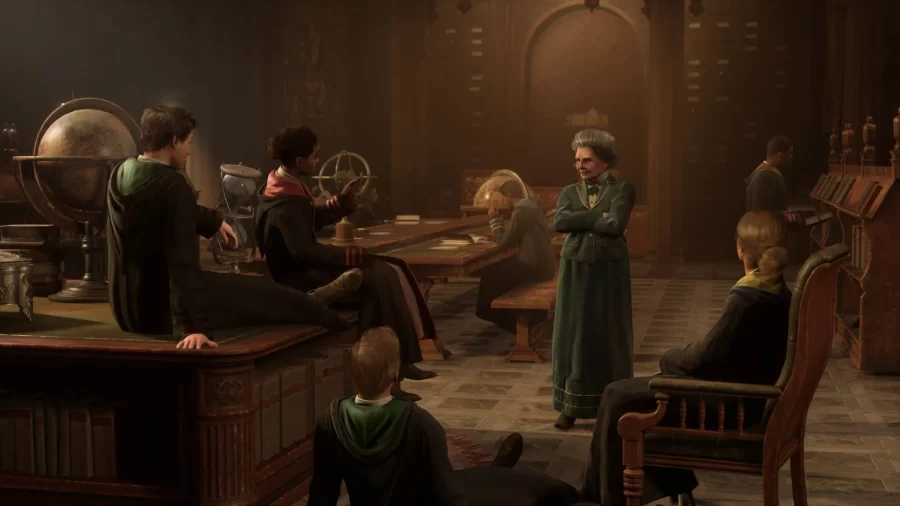Opinion | ‘Harry Potter’ franchise has grown beyond J.K. Rowling
Photo courtesy of Trusted Reviews
Screenshot from “Hogwarts Legacy.” With the recent release of “Hogwarts Legacy,” columnist Raphael Ranola argues that the “Harry Potter” franchise has grown beyond J.K. Rowling’s myriad controversies.
February 17, 2023
The recent release of “Hogwarts Legacy,” the open-world role-playing video game set over a hundred years before the events of the main “Harry Potter” series, has been met with some controversy.
Despite not having a direct hand in the involvement of the spinoff game — merely receiving royalties from being the creator of the franchise — “Harry Potter” author J.K. Rowling’s presence within the franchise is difficult to shed, largely due to harmful tweets made by Rowling in the past.
While Rowling faces backlash for numerous controversies, the most prominent is her characterization as a “TERF,” or trans-exclusionary radical feminist. This designation is derived from some of her tweets which argue in favor of the position that trans women are not “real” women.
Rowling’s name being attached to the franchise has prompted many gamers to boycott “Hogwarts Legacy” due to the damage she has caused to the transgender community.
For many, Rowling’s transphobia leaves a bad taste in the mouth and ultimately tarnishes the reputation of anything involving Harry Potter. Fans — and even the main actors from the “Harry Potter” movies — have made an effort to distance themselves from Rowling and her comments.
Get The Daily Illini in your inbox!
In a similar vein, Rowling came under fire for her depiction of goblins in “Harry Potter” being antisemitic because they were based on harmful Jewish caricatures. Adhering to typical Jewish stereotypes, her goblins appear as long-nosed and greedy bankers.
Despite all of this, I still intend to purchase and enjoy “Hogwarts Legacy.”
The people who contributed to the making of “Hogwarts Legacy” — the writers, scripters, game designers and voice actors — are not J.K. Rowling. They have made a valiant effort to appeal to childhood nostalgia using modern technologies to breathe new life into a tarnished franchise.
I’m planning to appease my inner child — visiting iconic locations from the movies, side-questing, casting spells and generally frolicking — in much the same way as I enjoy games whose franchises aren’t tied to problematic creators.
The opposite opinion, excellently argued by a fellow columnist, holds that it’s impossible to separate art from the artist, and that it’s easy to avoid consuming media created by controversial or problematic people.
While this may be true, staunchly following this rule discredits the many collaborators who put hard work into producing media, like “Hogwarts Legacy,” who do not hold the same views as the J.K. Rowlings of the world.
Boycotting “Hogwarts Legacy” purely on the basis that J.K. Rowling’s name is attached to the game could potentially lock fans out of enjoying an interesting and fully-realized world with hours of content to enjoy.
The examples of this phenomenon are numerous.
Video games belonging to the cosmic horror genre, like “Call of Cthulhu” or “Bloodborne,” owe their existence to H.P. Lovecraft, who was notoriously racist.
Similarly, “Five Nights at Freddy’s” franchise creator Scott Cawthon was found to have made financial donations to Republican candidates — much to the chagrin of the fanbase of the game, many of whom identify as being part of the LGBTQ+ community.
Do you want to enjoy genre-defining movies and TV series such as “Twin Peaks,” “The Godfather” or “The Grand Budapest Hotel”? How about “Pan’s Labyrinth”? Unfortunately, the directors of these iconic pieces of media signed the Polanski Petition, supporting their fellow director Roman Polanski, who was found guilty of sexual intercourse with a minor.
These are projects that require teams of hundreds, if not thousands, of people to create, and they are enjoyed by millions more. At a certain point, franchises transcend their creators — as problematic as they can be. “Hogwarts Legacy” is an attempt to do just that.
It is not my intention to enable transphobic rhetoric with my purchase of the game. Rather, it is to reward the hundreds of people who worked tirelessly to open a window into my childhood and those of millions of people like me.
Some of the most well regarded pieces of media are attached to bad people. When millions of people produce art, a small proportion of these people will inevitably use their influence to hurt others.
Thus, the way we should act when it comes to this contentious topic is to tread carefully and consume media with maturity and nuance. Disengaging from it completely is the wrong way to go about it. Otherwise, we’d run out of stories to fall in love with.
Raphael is a freshman in LAS.







